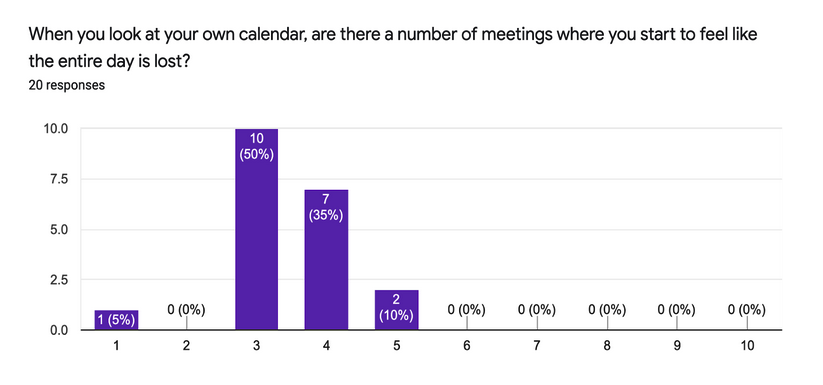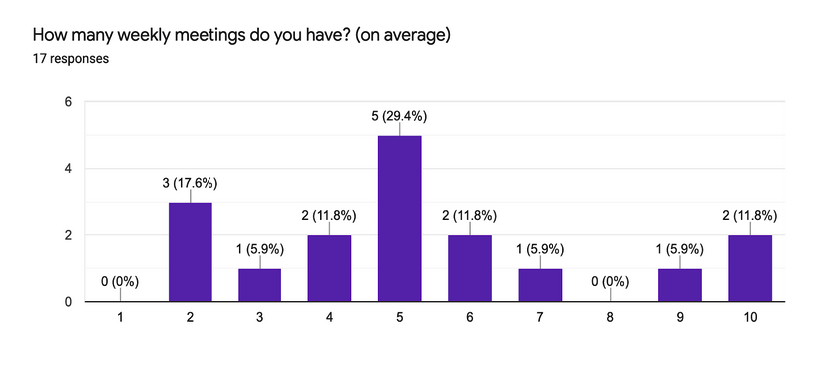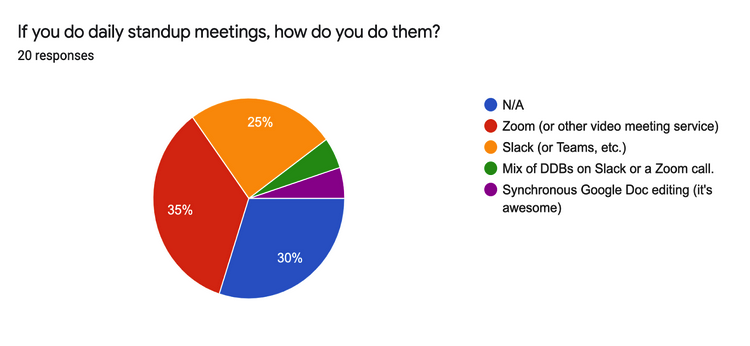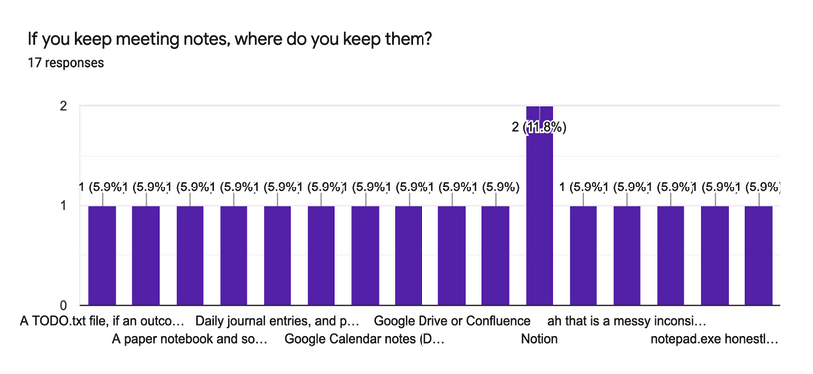
Now that the pandemic has changed the way we work and communicate indefinitely, we thought it would be interesting to reach out to our peers in the industry to see what their schedules actually look like, and what tools people were using to keep meeting notes.
A small note about how the data was gathered before we get started: one of the larger responder groups to the survey was the PDX Digital Project Manager Slack group, who may have parallel work sprints with daily stand up meetings.
Let's dive in!
When you look at your calendar, are there a number of meetings where you start to feel the entire day is lost?
It's easy for an entire day to feel lost when you open the calendar and have back-to-back remote meetings. This was especially true when I spoke with team members, especially developers, who were being interrupted multiple times throughout the day to attend meetings in which they had little involvement.

I love that one person responded that a single meeting was enough for their entire day to feel lost. Some days, this can definitely be true. But 50% of respondents agreed that three meetings per day was the tipping point for their day. A good clarifying question would have been: _How long are these meetings? _Three 15-minute stand up meetings may not be a problem. But three 1-hour meetings can easily impact how much work gets done in a day.
How many weekly meetings do you have (on average)?
Okay, about three meetings per day is when people start to feel a bit lost in what they need to get done, but how many weekly meetings do folks have?
29.4% of respondents had five weekly meetings, which is about one per day for the work week. As mentioned above, this aligns with daily standups for sprint-based work, but this also feels about right for remote work for non sprint-based teams.

If you have daily standup meetings, how do you do them?
At Planet Argon, we conduct daily standup meetings via a Slack-integrated bot called Geekbot, which sends a nice message to us every workday morning, that is very basic:
- What did you do yesterday?
- What are you doing today?
- Are there any blockers?
As a project manager, this is a godsend. I can quickly scan through bulleted lists of tasks to see where everyone's focus has been, will be, and if they need my help with anything. 25% of people - not all of them from Planet Argon, I promise! - also responded that they perform daily standups in Slack, 35% of respondents conduct standups via Zoom (or another video meeting service), and 30% of respondents did not do standups.
One interesting response was "synchronous Google Doc editing (it's awesome)," which I thought was an interesting idea! We do so much of our work in Slack that I don't know if it would work for Planet Argon specifically, but I love that people are using other tools to find ways that work for their teams.

If you keep meeting notes, where do you keep them?

This was the most fraught category of the survey, where only 2 people answered with the exact same tool. This graphic looks wild, but generally it boils down to: where am I going to find these notes and, more likely, will I ever need them again?
Personally, my system is always in flux. Currently, I take notes during meetings in a paper notebook, then transfer those notes to Confluence under the client's space. This makes the notes searchable and easy to reference, or tag people in, later. With busier clients, where we are reviewing a larger number of tickets each meeting, I often make notes directly in the Jira ticket we are talking about. This only works because we check on each ticket every week, so they are constantly in mind/prioritized.
When scheduling meetings with team members, are there certain times of the day you try to avoid?
When to schedule meetings was the second most fraught question in the survey, which I think is largely due to how remote work has scattered teams into different time zones and necessitated flexibility in when meetings can happen. On average, most responses were something along the lines of: after 9am and before 4pm, but avoid lunchtime, and consider east coast vs. west coast time zones.
Recently, thanks to some feedback from the Engineering Manager and development team, we've implemented a meeting blackout day for developers. Every Wednesday: no weekly meetings, no pairing sessions (if possible), and no client meetings are scheduled. This allows for one day of reduced distractions from being able to dive into more complicated projects and tasks.
But how many meetings are too many?
I think this will differ for each team and the work they do. At Planet Argon, we perform client-based work on a retainer or project basis, which means we have either weekly or bi-weekly check-ins with all of our clients on a number of important aspects. But another company may have internal project-based sprints, which may require daily check-ins that are shorter.
If you are feeling overwhelmed by meetings, here are some things to consider:
- Does this meeting need to happen? (or, does this need to happen weekly?)
- Could this meeting be an email, or a Notion/Asana/etc. task instead?
- Are all of the attendees currently invited necessary, or could they be sent notes after the fact?
- Is this meeting too long?
- Do we have dedicated blackout days or times of the day for deep focus?
To conclude: meetings are important!
In the remote workplace, it can be difficult to build and maintain team dynamics. One of the ways we combat this at Planet Argon is to have a donut chat every few weeks between randomly selected team members, where they have 15 minutes to meet up on Zoom and chat about anything not related to work. These are not the kinds of meetings you want to cut from people's schedules! They help a workplace feel more alive and interesting.
Of all the responses to the survey, the questions of "what are symptoms of a bad meeting?" was the most succinct. 60% of respondents specifically called out "no agenda" or "lack of preparation" as the thing that makes a meeting bad. Other interesting responses were "dead air", "needless introductions", and "where no action points were documented." If you find yourself leading these kinds of meetings: post an agenda in advance or, if the meeting is impromptu, review the purpose at the top of the meeting briefly so folks know what to expect.
As with anything, there will be a certain amount of outlying opinion about meetings and their usefulness. So, it's important to evaluate your schedule often. Is this necessary? Do we ever use this time for anything productive, or is it a lot of chit chat followed by a single update on something everyone knows about? Cut it out. Reduce the time allotted to meetings; try something different for a lengthy retrospective or planning session to reenergize the work; read about how other teams do meetings; or check in with your team members - they may have a better way to keep eachother updated!